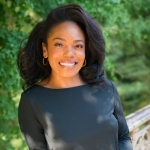
FELLOW
ADRINDA KELLY
DIRECTORY | FELLOW PROFILE

ADRINDA KELLY
TITLE
Executive Director
ORGANIZATION
Black Education For New Orleans
BIOGRAPHY
Adrinda “Drin” Kelly believes her singular most important qualification
for serving as Executive Director of BE NOLA is that she is living
proof of what happens for Black children when Black educators are
supported to do their very best work. Through this lived experience,
she developed the phrase “spirit capital.” This concept says that
being Black is not a risk factor. It also supports the importance of
representation and provides a clear message that the point of striving
for excellence is not just a college degree and a comfortable
middle-class life but getting tools to come back and build up your
community.
With this thought process, Drin took off to gather relevant
experiences to bring home someday. She carried with her memories
of her first Black teacher, Oretha Castle Haley, whom she
affectionately knew as Mama Oretha. Because of Mama Oretha’s
teachings, Drin understood early that to be a Black child was to be
smart, excellent, beautiful, joyful, and beloved. In 1998, she had what
she refers to as the “dubious distinction” of being the only Black
student from Louisiana to matriculate to Harvard University that year,
from which she graduated with a B.A. in English. She also holds an
M.A. in Humanities and Social Thought (Global History) from New
York University. With a lifelong interest in inclusive narratives and
storytelling, she began her career in New York City in publishing,
eventually working as a book and digital content editor for Time
Warner, McGraw-Hill, and Princeton Review. Her projects focused on
serving the needs of diverse student populations, specifically
first-generation college students, LGBTQ students, and
underrepresented minorities.
During her time away, the infamous Hurricane Katrina ripped through
New Orleans, and her hometown shifted in many ways resulting in
further disenfranchisement for all marginalized groups, especially
people who looked like her. That’s when paying it forward took on a
whole new meaning and she was called home, critical examination
skills in tow. As the city began its rebuilding phase, many people of all
professional backgrounds, in all sectors, took to invoking the
phraseology “pre-and post-Katrina.” The city’s public school system
was not excluded from this comparison; however, Drin considered the
better question to be: Why has the lack of investment in New Orleans
Black children been a feature of public education in New Orleans
over the last 140 years - and what can we do about it? With this
question in mind, she’d take the reins of this very special organization
and develop a solid pedagogy that supports the mission of BE NOLA.
Everything she’s gathered throughout the merging of her personal
experiences and professional life leads her to want to address the
root cause(s) of the challenges we face and explore ways to tap into
a deeper knowing – ancestral knowledge, epigenetic witness, faith,
memory, history – to do the thing we already know how to do - which
is to love and care for our children with such focus and ferocity that
the broken systems around them can't help but transform. Drin is
proud to lead an organization that gets to focus on protecting and
championing quality Black educators and the schools they lead. The
biggest thing, however, is that this work is not about competition and
creating a system of winners and losers – it’s about making sure
every school is great and every child is thriving.
Drin has worked in the education sector for 19 years. In each of her
roles, she’s been on the front end of birthing something new into the
world that amplifies the voice and agency of marginalized
communities. This pattern has shaped her life’s work in getting to the
root of why that pattern of neglect exists, who is made most
vulnerable because of it, and what can be done about it. Immediately
before BE NOLA, Drin was the national managing director of staff
diversity, equity, and inclusiveness strategy at Teach For America and
led several initiatives focused on strengthening staff and alumni
communities of color. She has written on the intersection between
race, history, and education for Teachers and Writers Magazine,
Students at the Center, and the Journal of Humanities and Cultural
Studies. In 2008 she was a Diversity Studies Fellow at the University
of Cape Town. She is an active member of the McDonogh #35 Alumni
Association and the Education Leaders of Color Network, and is an
alumnus of the Pahara NextGen Fellowship and Loyola Institute of
Politics. She lives at the edge of a parade route in New Orleans with
Alix, her partner of 20 years, and their adorable boxer Muggs who
likes to chase flying beads.
